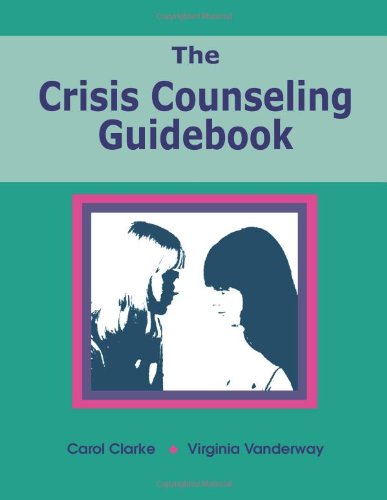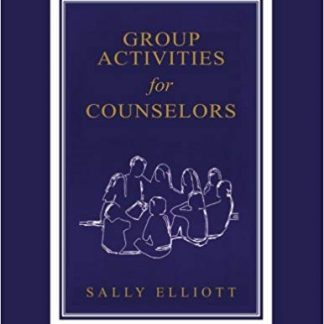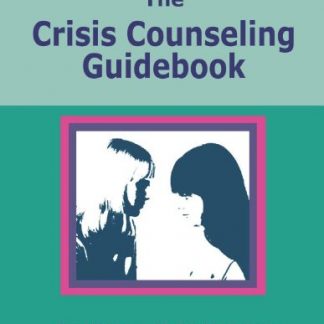Description
Carol Clarke & Virginia Vanderway
Helping children and teens during and after a crisis situation requires a cool head, a caring heart, and a specialized body of knowledge and skills. Crisis intervention skills are becoming indispensable as the number of crisis incidents increases.
Be prepared for all possibilities when a crisis does occur. Recognize the wide range of emotional and behavioral responses – and know how to provide needed support. This indispensible guidebook, created by two veteran crisis counselors, looks at issues and provides the answers you need to give helpful support to students and staff alike.
Contents include:
❖ Guidelines for effective crisis response
❖ Unique features of crisis counseling
❖ How to assess a crisis situation
❖ Self-care during and after a crisis
❖ Individual and group crisis counseling strategies and activities
❖ Tips on Psychological first aid
❖ Developmental differences in response to crisis
❖ Tips for parents
❖ Sample management forms, announcements, and letters
❖ Quick reference charts
Also includes guidance on dealing with specific crisis situations: Death and Loss Suicide, Natural Disasters Deployment to War, Violence and Gang Disturbances, Kidnapping/Abduction, Terrorist/ Hostage Situations
Table of Contents
CRISIS COUNSELING
What Constitutes a Crisis?
Common Characteristics of Crisis
Types of Crises
CRISIS STRATEGIES, INTERVENTIONS AND ACTIVITIES
Crisis Intervention Strategies
Unique Features of Crisis Counseling
Assessment of the Immediate Situation
Your Frame of Mind During and After a Crisis
Tips on Psychological First Aid
When Crisis Counseling Is Needed
Guidelines for Crisis Counseling
Developmental Issues
Reactions to Crises: Developmental Differences
Classroom Intervention Activities
Preschool and Kindergarten Activities
Elementary School Activities
Additional Strategies for All Ages
Classroom Discussion Guide
Self-care, During and After
The Debriefing Meeting
Post Traumatic Stress Disorder
Symptoms of PTSD
Tips for Reducing Post-Crisis Stress
Referral Services
DEALING WITH SPECIFIC CRISIS SITUATIONS
Death and Loss
Four Psychological Tasks Related to Death for Children and Adolescents
Handling the Class after a Student Dies
Terminally Ill Students
Responses to Death and Loss
Helping Children Through Death and Loss
Death Education
Stages of Grieving
Facing Death: Six Stages
After a Death in the Family
Subconcepts About Death That Children Attempt to Understand
Developmental Responses to Death, Loss, and Grief
Suicide
Facts about Suicide
Social Conditions Associated with Suicide
Making an Intervention
Things to Do
Hints for Dealing with a Potential Suicide
Things Not To Do
Determining the Degree of Risk
How to Deal with a Suicide
Counseling in the Wake of Suicide
An Action Plan for Schools
Indicators of Potential Teen Suicides
Direct Actions of Preventing Suicide
Natural Disasters
Feelings/Reactions
Dealing with the Feelings/Reactions
Physical Side Effects
Things to Keep in Mind
First Aid Strategies: Earthquake
Fear and Anxiety
Advice to Parents
War
When Parents Are Deployed to a War Zone
- Preschool & Kindergarten
- Elementary School
Violence & Gang Disturbances
Things to Keep in Mind
Kidnapping/Abduction
Feelings/General Reactions
Prevention Strategies
Issues and Points to Keep in Mind
Terrorist/Hostage Situations
Feelings/Reactions and Hints for Dealing with Them
Things to Keep in Mind
HOW PARENTS CAN HELP IN A CRISIS
Following a Crisis, Some Children May:
Ways Parents Can Help Their Children
FORMS AND SAMPLE LETTERS
ABOUT THE AUTHORS
Primary Subject Area – Counseling
All Ages, 120 pages, 8-1/2 x 11, paperback, reproducibles






Reviews
There are no reviews yet.